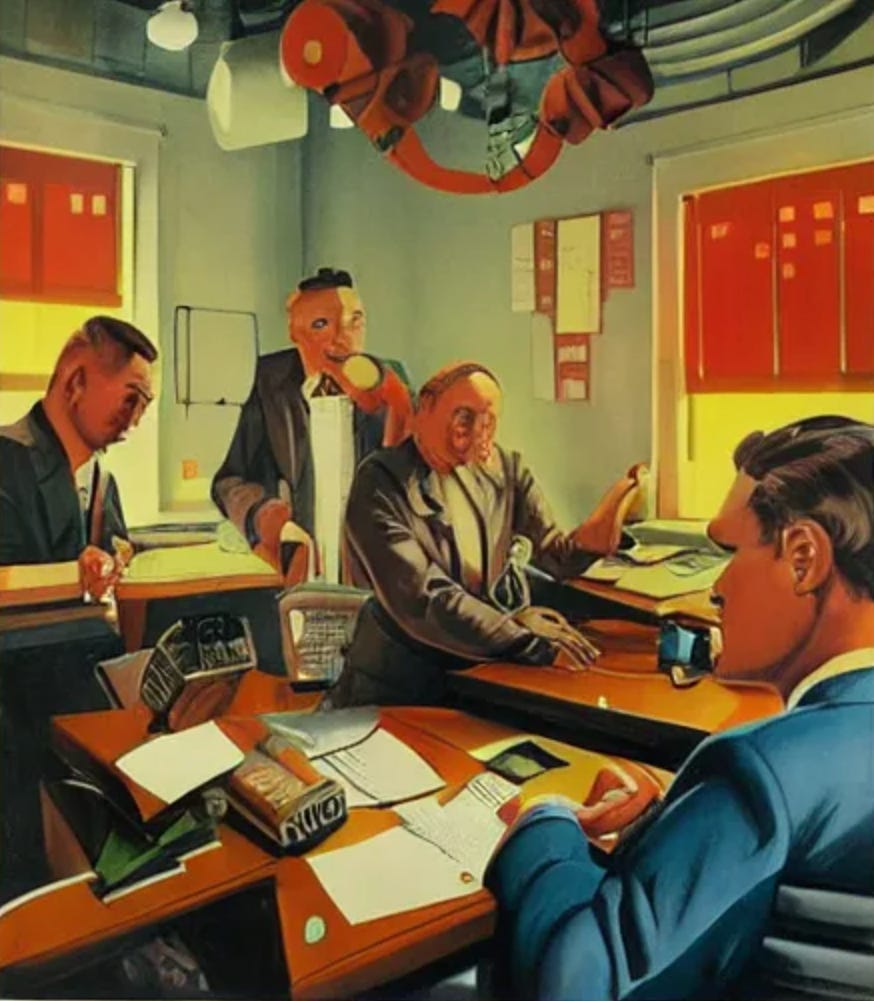The Consultants (5/30)
Thirty essays in thirty days, number five
I remember the corporate house in Austin, the deafeningly quiet two-story McFarmhouse with the Wayfair TV stand and the faux-wood floors. Dad drove up from Houston because I was too depressed to eat. He took me to HEB to get groceries and then stayed with me and cooked me breakfast before I dragged myself to work.
Work was the consulting job. We had an engagement with LCRA, the Texas power municipality. We were supposed to be helping them set up their Energy Trading Risk Management (ETRM) system so that they could model all their trades and see all their numbers and help make sure all the people in Texas got power. Our Managing Director, the leader of the project, promised LCRA that we were the best firm for the job; we could get the project done cheaper and faster than anyone else. And we had the experts. I was one of those experts. I had worked at the consulting company for two months and started learning about the power industry in the second month. I got certified in the ETRM software two weeks before we started. I was an expert. They billed me out at $150 an hour.
LCRA put us, the consultants, in a little windowless room on the second floor. Most of the time we kept the door closed. I wasn’t sure why until one day our project manager had an argument with someone at LCRA. I think they were fighting about how a certain kind of trade was settled in the Texas power market, something that anyone with any industry experience would know.
“That’s not how it works!” Rahim, the LCRA employee, yelled. The old man had been working in the Texas power industry for something like forty years—about as long as our project manager had been alive. “We have never modeled it this way!”
“Rahim, I’ve managed tons of projects like this, and this is how it’s always done,” the project manager said with his shoulders back. Rahim stared at him for a moment, then scoffed and walked out, slamming the door behind him.
“Actually, I’ve never seen this kind of trade,” our project manager admitted. “He’s probably right.”
That was why we kept the door closed—to preserve our perceived expertise. The Managing Director spent most of his (sparse) time in that little office on calls, loud calls, about other projects. Occasionally he would ask us about the progress on a certain part of our project, often calling it by the wrong name or referring to something we had already finished or hadn’t yet started. He liked to tell stories about taking customers out on his fishing boat.
One time the Managing Director took me to lunch. We went to a food truck, a Mexican place I think, on 5th Street on the edge of downtown Austin. He spent most of the lunch telling me how good of a job I was doing in between calls with the home office and stories about taking customers fishing. But then he told me to be careful. I saw something you put on Facebook recently, something about Trump’s candidacy, he said. You have to be careful with that kind of stuff. Guys like Dave (the head of the project at LCRA, the guy who hired us) might see it and get the wrong idea. He didn’t tell me what the wrong idea was. Sometimes after work we would take Dave out drinking in downtown Austin. Dave was a good-looking guy, older, shaved head, divorced. He liked whiskey and younger girls. My Managing Director frequently reminded us of the fact that we needed to make sure Dave had a good time. This was how you did business.
Another time we were driving to dinner, the Managing Director and me. Something happened with the kid running the valet stand. I don’t remember what it was—maybe he wouldn’t let me park in one of the spots that was supposed to be open or he tried to get me towed or something. I don’t know. But I do remember yelling at him and making a spectacle of slamming my door. The Managing Director gave me a pep talk. You’ll always be better than that kid, he said. You make way more money than he does.
LCRA ended up suing us. They said we didn’t hold up our end of the contract, that we didn’t deliver what we promised. They said we weren’t the experts that we made ourselves out to be. Because of this, they argued, the project took months longer than it should have and cost hundreds of thousands more. My job became to help go through our outside counsel’s prepared documents and make sure the details were all correct, finding ways to help our case. I worked hard. They liked me.




The law of Chekov's gun says Dave's interest in younger girls is going to come back and bite him. Right?
Right???
Growing up we're supposed to be taught how to build character, but it seems a lot people only learn how to become a caricature.